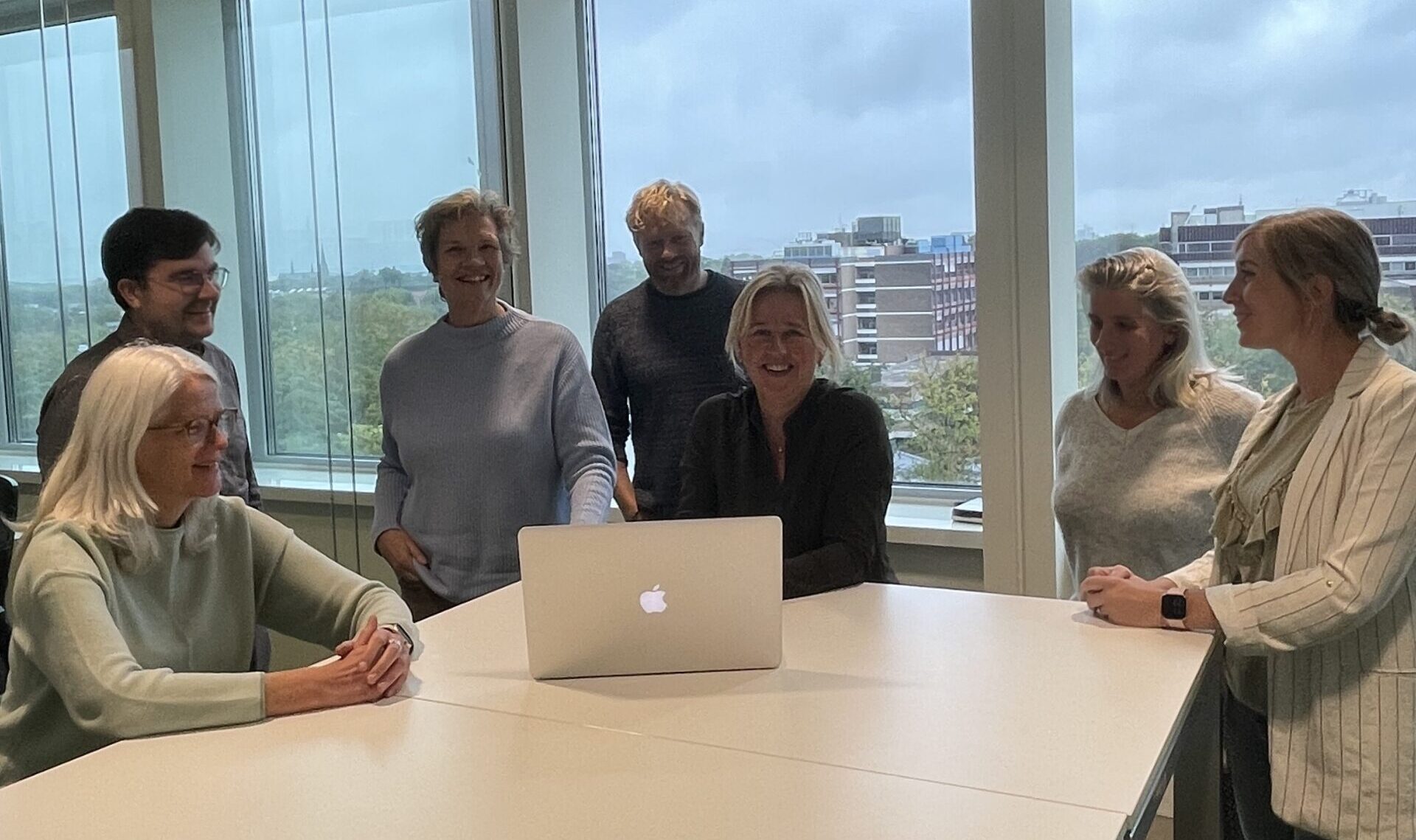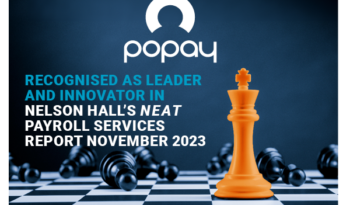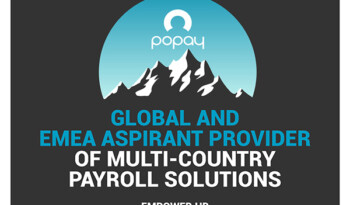Popay significantly shortens the new-hire workflow at Radboudumc


15 Oct 2022

Radboudumc has around 20,000 employees: 11,000 of these staff are in salaried employment while 9,000 are non-salaried such as interns, agency workers, outsourced workers, guests and volunteers. It deals with 500 new applications every month on average and has 60 different types of contracts in total. Before someone is hired, their qualifications must be checked, they must have a Certificate of Good Conduct (VOG) and have completed a medical screening. This all created a workflow for hiring new staff at Radboudumc in Nijmegen that could easily take six weeks. Time for digitisation and automation. The result? Now everything can be organised in one day if needed. Hetty Dortmans (HR Services Manager) and Silvia Verstegen (Information Management Project Leader) tell us how they managed to do this with Popay. Get to know ‘project Welcome’!
Radboudumc employs 1,500 to 2,000 staff who have the authority to hire new people. The process starts with the manager: they request basic data from the new colleague and use this to create a profile. This is followed by all the screening, testing and data completion, until everything is complete and the employment contract can be signed. While this could sometimes take up to six weeks previously, someone can be on the hospital payroll in a few hours now.
HR’s wish: save time and work more efficiently
Hetty is responsible for HR Services, including supporting staff recruitment, promotion and departures. She wants colleagues in her teams to support managers and new employees as best they can. ‘Many colleagues experienced the whole process of selecting a candidate to the signed contract as a thorn in their side,’ explains Hetty. ‘We were already working with a comprehensive HR Self-Service tool, with all systems linked to each other by Popay. But we were ready for the next step. We wanted to fully digitise and automate the preliminary process of drafting an employment contract. The goal? To save time and capture data once only. Silvia joined as project leader from the Information Management department and started working with me on this.’
Silvia adds: ‘I enjoy working on ICT projects, assignments with a start and finish line. There was a concrete issue on the table here. Previously, new employees had to fill in the same details three times on different forms and then HR had to retype it all. And then when an employment contract was ready for signature, several people had to sign it. Given the 20-minute walk from one end of our site to the other, this was hugely time-consuming. Querying screenings and recording results were also all done manually. ’
‘At Popay, they not only think about the technology, but also the process. And that helps tremendously.’
Hetty Dortmans – HR Services Manager
Customisation by Popay: a proactive approach to technology and process
With such a requirement, the question is: how will you accomplish it? Hetty explains: ‘At HR Self-Service, we have been looking at ways to automate and digitise the intake process. We work with Oracle EBS; we investigated that option first because that’s our source system. Then you don’t need extra links or connections. Moving away from Oracle would limit Radboudumc and leave too few technical options. We already knew Popay; they had previously set up our full HR Self-Service, so we went to talk to them first.’
After Radboudumc decided to proceed with Popay, the collaboration started immediately. The expertise and confidence were already there. Silvia recounts: ‘On the front end, we had weekly meetings for a year with Pim from Popay and the Radboudumc project team to lay the groundwork in terms of content. We knew which processes we wanted to automate, but not yet how. I think Popay contributed a lot of expertise in that regard. They know how HR processes work, including at other clients, and could thus advise us well. How to logically sequence all the steps and bring them together.’ Hetty adds: ‘That’s true – at Popay, they not only think about the technology, but also the process. That is a tremendous help.’
‘The process was clear, but the detailing for the different types of contracts turned out to be quite complex. Popay managed to use their expertise to find the solution.’
Silvia Verstegen – Information Management Project Leader
Complex puzzle: solved down to the last detail
Hetty, Silvia, the project team and the Popay team have been hard at work for two years. First a year of preparation, followed by a year of implementation. ‘We didn’t realise that we’d need so much time beforehand,’ Silvia says. ‘Although the new process was clear and simple in outline, it proved to be quite complex when it came to detailing the different types of contracts. We have as many as 60 different forms of contracts, and we have to deal with a difference between salaried and non-salaried colleagues. When you start translating that into technology, exceptions come to light. These exceptions must then be adjusted in the process or in the system. Popay managed to use their content-related expertise to find the solution. Based on the data entered by the new employee, the correct processes are now initiated fully automatically and the correct contract is drawn up – with the correct attachments and in the right language. Apart from building this new system, Popay also had to make it talk to four other systems. Popay’s technical experts were also able to create these links in collaboration with the experts from the external systems.’
Hetty adds: ‘We now have one source with all the data. Employees enter their data once and that data is sent everywhere from the source, such as for medical screening, requesting qualifications or the certificate of good conduct. Previously, this all had to be done with separate emails or through separate systems with a login. If the employment contract is digitally signed, this is automatically linked to payroll processing and includes all documents in the digital personnel file. And then the process is complete. Once you are employed, you have access to HR Self-Service. Employees can access their files there, retrieve documents, process changes, submit leave, and so on.’
‘We’ve been working with the system since 12 April and are already seeing the great benefits of using it and speeding up the process.’
Hetty Dortmans – HR Services Manager
Business case: short- and long-term gains
And then, of course, the question is: is the business case complete? Fortunately, Hetty can reply with a resounding ‘yes’ to that question. ‘You invest in such a project and you have to be able to recoup that investment. ‘We’ve been working with the system since 12 April and are already seeing the great benefits of using it and speeding up the process. We are making gains in several areas. First of all, we save a huge amount of time with those 500 new applications a month. We can welcome new colleagues much faster. This is a major plus, especially given the tight labour market at the moment. In addition, payroll previously checked all data manually at the end of the process. This team no longer checks contracts. The auditor has checked and approved this: because we have set everything up so well digitally with all kinds of checks by authorised persons, there is no need for a final check. That also saves time.’
The managers are also delighted with this system, says Silvia: ‘Managers can now see in a glance exactly which stage of the process a new employee is at. They no longer need to call HR for that purpose. If it takes too long, the system will issue an alert. This means you no longer have to actively monitor the system yourself; you can see what is still open and what the status is at any time. And it is, of course, a great showcase for Radboudumc if new employees can submit all their input digitally from home. ’
‘I think we’ve produced an admirable result. What we’ve built with Popay, including the interaction with external systems, does not exist in the market as a product.’
Silvia Verstegen – Information Management Project Leader
Proud as a peacock of this unique result
To say Hetty and Silvia are proud of this result is an understatement. Hetty: ‘I’m beyond proud and not shy to shout it from the rooftops. We have regular consultations with other university medical centres and that’s when you can see that we are really leading the way in this. Of course, other hospitals have also automated and digitised processes, but we have achieved it completely, including the qualifications check, certificate of good conduct application, medical screening and digital signature. The limitation of a standard system is you don’t have these options. By building it yourself with a partner like Popay, technically many more options exist.’
Silvia, too, is proud. ‘I think we’ve produced an admirable result. Now that we are live, you can see that details and exceptions have been so well thought out on the front end that it runs like clockwork. What we’ve built with Popay, including the interaction with external systems, does not exist in the market as a product. At least not for this full breadth and all its variations. And with this shift to digitisation, we are working paperless and signing digitally, which is also better for the environment.’
‘Popay trains our application and functional administrators so that we can manage the system in-house.
Hetty Dortmans – HR Services Manager
Opportunities for the future
But Hetty sees even more opportunities for Radboudumc. ‘Before someone is hired, there is a recruitment and selection process that involves a lot of communication. We can also include that in digitisation and automation. And after the employment contract has been signed, a host of things still need to be arranged, such as a phone, laptop, key and authorisation badge,’ Hetty explains. ‘We also want to automate that front and back end of the recruitment and selection process later. But first, let’s get to work on this. Popay trains our application and functional administrators so that they can manage the system themselves. Popay also provides that aspect of after-care in the form of training. So we are beyond satisfied,’ Hetty concludes enthusiastically.

Whereas HR staff tend to have less technical savvy, IT staff in turn can find it difficult to clearly explain how certain…
Find out more
In the ever-evolving landscape of HR management and payroll administration, finding a reliable software provider is crucial. Popay is the name you…
Find out more
2 Recognitions in 2 consecutive months by 2 Global HR Solutions Assessors! Popay has received yet another prestigious recognition, this time, on…
Find out moreThe new Brussels University Hospital really has been through the mill lately. Claire Dessaer, HR Manager Remuneration and Operational Services In the…
Find out more
Shortcuts and quick fixes are nowhere to be found with this Popay lady. Annelies is all about long-term solutions that significantly reduce…
Find out more
From a start-up of only 3 Founders in Belgium 2 decades ago, Popay is proud to be recognized in the 2023 edition…
Find out more
The entire payroll process runs like clockwork thanks to a bespoke connector Uniting to save and sustain lives. That is the mission…
Find out more
At 60 years old, Yvonne has been with Popay for a while. She has gained a variety of experiences in her career…
Find out more
It’s impossible to miss when you see Dorien walk by… that enthusiastic smile. That ‘bring it on’ look. And even if you…
Find out moreCONTACT US
Let’s get in touch
| Cookie | Duration | Description |
|---|---|---|
| cookielawinfo-checkbox-analytics | 11 months | This cookie is set by GDPR Cookie Consent plugin. The cookie is used to store the user consent for the cookies in the category "Analytics". |
| cookielawinfo-checkbox-functional | 11 months | The cookie is set by GDPR cookie consent to record the user consent for the cookies in the category "Functional". |
| cookielawinfo-checkbox-necessary | 11 months | This cookie is set by GDPR Cookie Consent plugin. The cookies is used to store the user consent for the cookies in the category "Necessary". |
| cookielawinfo-checkbox-others | 11 months | This cookie is set by GDPR Cookie Consent plugin. The cookie is used to store the user consent for the cookies in the category "Other. |
| cookielawinfo-checkbox-performance | 11 months | This cookie is set by GDPR Cookie Consent plugin. The cookie is used to store the user consent for the cookies in the category "Performance". |
| viewed_cookie_policy | 11 months | The cookie is set by the GDPR Cookie Consent plugin and is used to store whether or not user has consented to the use of cookies. It does not store any personal data. |